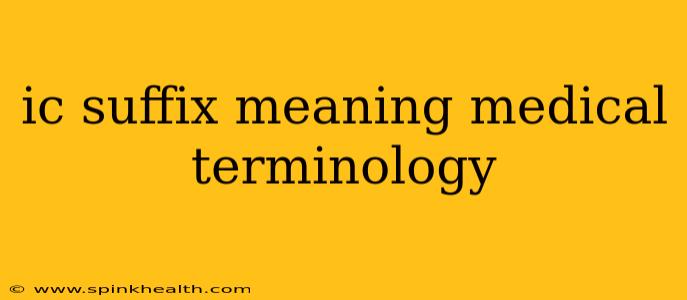Decoding the Medical Mystery: Understanding the "-ic" Suffix
The seemingly simple "-ic" suffix holds a powerful key to unlocking the meaning of countless medical terms. It's not just a random addition; it carries a significant weight, transforming words and subtly shifting their meaning to signal a specific relationship. This isn't just about memorizing definitions; it's about understanding the why behind the medical lexicon. Let's embark on a journey to uncover the secrets of "-ic" in the medical world.
Our story begins, not in a sterile laboratory, but in the bustling marketplace of ancient Greece. Many of our medical roots trace back to this era, where philosophers and physicians alike sought to understand the human body. The "-ic" suffix, in its essence, reflects this ancient pursuit of categorization and definition.
What exactly does "-ic" mean in medical terminology?
At its core, the "-ic" suffix denotes pertaining to, relating to, or characterized by. It acts as a modifier, adding a layer of specificity to the root word it's attached to. This means that a term ending in "-ic" describes something connected to a particular condition, substance, or process within the body.
Let's illustrate this with some common examples:
-
Cardiac: The root "cardi" refers to the heart. Adding "-ic" gives us "cardiac," meaning "pertaining to the heart." So, a cardiac arrest is an arrest of the heart's function.
-
Hepatic: "Hepat" relates to the liver. Thus, "hepatic" signifies "relating to the liver." Hepatic failure, therefore, means the liver is failing to perform its vital functions.
-
Toxic: "Tox" signifies poison. "Toxic" then describes something poisonous or relating to poison. Toxic shock syndrome, for example, is caused by toxins produced by bacteria.
-
Diabetic: This one requires a bit more nuance. "Diabetic" doesn't just mean "pertaining to diabetes"; it describes a person affected by diabetes. The "-ic" suffix here signifies the condition itself impacting the individual.
Common Questions about "-ic" Suffixes in Medical Terminology
Here are some frequently asked questions about this intriguing suffix, answered with the same detail and clarity you'd expect from a seasoned medical professional:
1. Are there any exceptions to the "pertaining to" rule?
While "-ic" predominantly signifies "pertaining to," subtle nuances can exist depending on the context and root word. There isn't a strict, unwavering rule, but the core concept remains consistent: it connects the term to a specific area, process, or characteristic. Careful consideration of the entire term is crucial.
2. How can I quickly learn to identify and understand "-ic" suffixes in medical terms?
The best approach is a multifaceted one. Start with learning common root words in medical terminology. Understanding the foundation—the root word—provides the framework for grasping the "-ic" suffix's role. Utilize medical dictionaries and flashcards, focusing on the root, and then observe how the "-ic" suffix modifies the meaning.
3. Are there any other suffixes that have similar meanings to "-ic"?
Yes, several suffixes convey related meanings. "-al," "-ar," and "-ary" frequently function similarly, indicating connection or relation. For example, "muscular" (pertaining to muscles) parallels "myocardial" (pertaining to the heart muscle). However, subtle differences in connotation might exist, so careful study is recommended.
4. How are "-ic" suffixes used in diagnoses and treatment descriptions?
"-ic" suffixes are fundamental to precise medical communication. They allow physicians and other healthcare professionals to communicate clearly and concisely about specific body parts, conditions, and treatments. For instance, a diagnosis of "septic shock" precisely identifies a serious condition stemming from infection. The suffix facilitates clear communication crucial for effective care.
5. What are some resources to help me improve my understanding of medical terminology?
Many excellent resources exist for learning medical terminology. Medical dictionaries (online and print), anatomy and physiology textbooks, and online courses are invaluable tools. Furthermore, actively engaging with medical literature and observing the usage of "-ic" suffixes in real-world medical contexts—such as patient charts or research papers—greatly enhances understanding.
Mastering medical terminology, particularly the subtleties of suffixes like "-ic," is a continuous journey. It demands dedication and persistent exploration. But with diligent study and a keen eye for detail, the seemingly cryptic world of medical jargon can reveal its secrets, unlocking a deeper understanding of the human body and the art of medicine.

